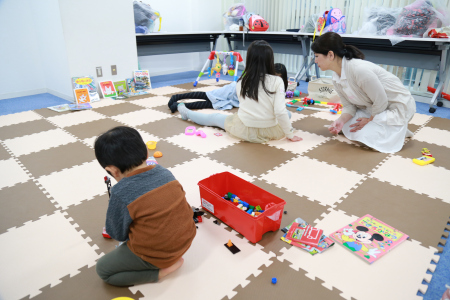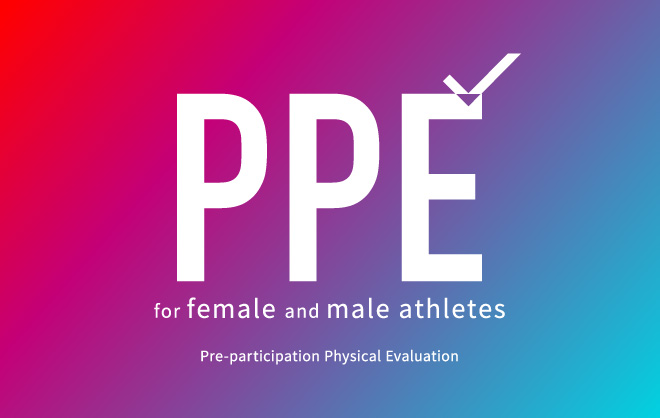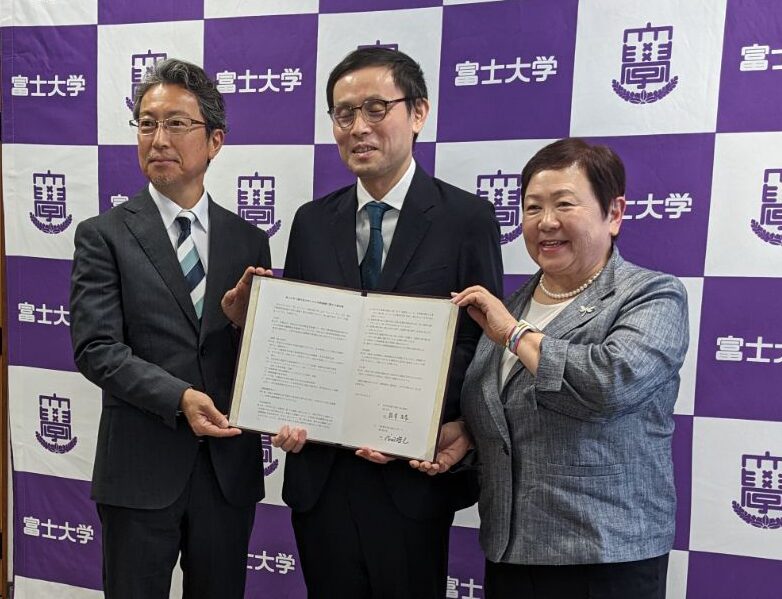“Female Athletes Active Support Seminar 2019” Event report
<Keynote Speech>
「“What you need to know about sleep if you are an athlete -What we can learn from EEG measured during menstruation-” 」
Dr. Takatoshi Kasai (Associate Professor of Cardiology and Cardio-Respiratory Sleep Medicine at Graduate School of Medicine, Juntendo University)
<Panel Discussion>
Panel Discussion
Panelists:
Ms. Miho Oki
(Road Racer, participated in Sydney, Athens, and Beijing Olympic Games/ Japan Keirin Auto race Foundation/ Member of JOC Women’s Sport Technical Committee/ Member of Girls Training and Development Section in Japan Cycling Federation/ Student in a master program of Graduate School of Health and Sport Science at Juntendo University)
Ms. Eriko Sanmiya
(Speed Skater, participated in Nagano and Salt Lake Olympic Games/ Sports Commentator/ Director of Japan Cycling Federation)
Ms. Akiko Adachi
(Goalball Player, participated in Beijing, London and Rio Paralympics and won a gold medal in London/ Student in a master program of Graduate School of Health and Sport Science at Juntendo University)
Ms. Kayo Kitano
(GK coach of U18 National Women’s handball team and National Training Academy, Japan Handball Association/ School Nurse at Rokkakubashi Junior High School)
Dr. Yuko Matsumura
(Research Assistant of Department of Obstetrics and Gynecology at Juntendo University Graduate School of Medicine/ Obstetrician & Gynecologist at Women’s Sports Athlete Clinic of Juntendo University Hospital)
Coordinator:
Ms. Natsue Koikawa
(Deputy Director of the Japanese Center for Research on Women in Sport /Senior Associate Professor at Faculty of Health and Sports Science, Juntendo University)
This seminar was held with the hope for female athletes to be more active by being released from various issues. In the keynote speech, the topic was regarding the “sleep” of female athletes, and the topic for the panel discussion was “sanitary products”. As the results of the questionnaire survey conducted by the Japanese Center for Research on Women in Sport were presented, ways to improve sleep and sanitary products to make female athletes more active were considered together.
A total of 129 people including visitors from distant places participated throughout the day regardless of the severe cold weather. The venue was filled with enthusiasm from the passionate comments of the speakers as well as serious questions from the participants.
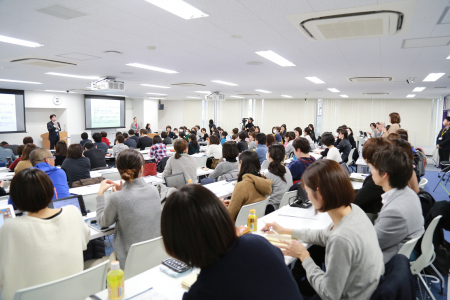
Keynote Speech
He explained general information such as the sleep mechanism in an easy-to-understand manner and shared his specialized knowledge such as the actual situation of sleep disorders and the gender and age differences in diseases. After that, based on the data obtained from research on athlete’s sleep, he talked about the relationship between female athletes and menstruation and shared some tips for sleep that can improve performance.
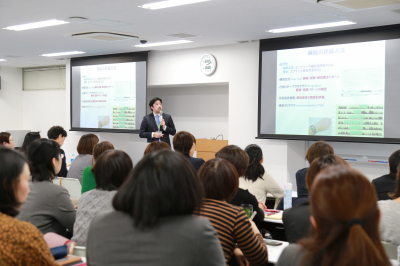
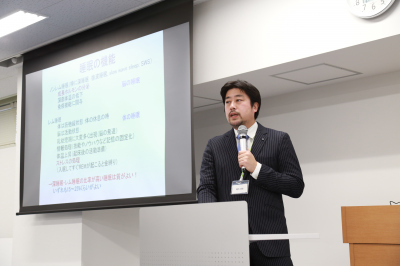
Dr. Kasai provided explanations that everyone could understand easily by utilizing valuable data. Participants listened intently while taking notes
Panel Discussion
In the panel discussion on “How do you manage your sports activities during menstruation -Every day, Be Active!-“, Ms. Natsue Koikawa, Deputy Director of Japanese Center for Research on Women in Sport (Senior Associate Professor at Faculty of Health and Sports Science,Juntendo University) served as the coordinator and explained the theme by showing the results of the “Survey and research on sanitary products for female athletes and para-athletes”. Specialists from various positions such as athletes, coaches, school nurses, and doctors were invited as panelists and each panelist presented unique episodes based on their wealth of experience in competitions, coaching, and living abroad.
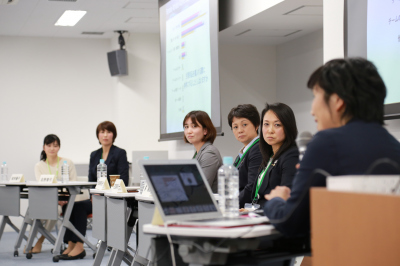
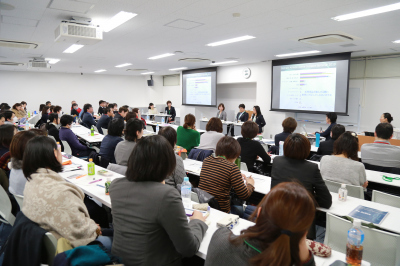
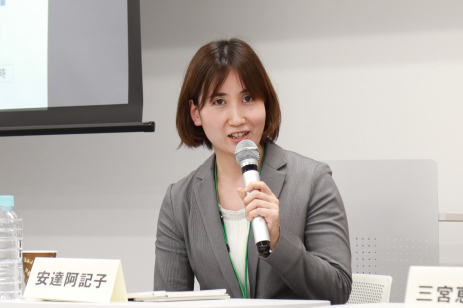
Since last year, the Japanese Center for Research on Women in Sport surveyed sanitary products targeting Japanese top athletes and para-athletes. According to the survey, 51.9% of the athletes answered, “I feel that sanitary products can cause the deterioration of performance.” Therefore, first, panelists who were longtime active athletes in different sports were asked, “What kind of sanitary products were you using during sports activities?”
Tampons were the mainstream for speed skating, road race, and aesthetic ballet in which athletes were required to wear adhesive uniforms. Ms. Akiko Adachi, who is an active goalball player, explained the reason why tampon had not been familiar and said, “As I have a visual impairment, I tend to continue using what I used to use before because it is difficult to get information and reach out for other things. Thus, I would like to take this as an opportunity to convey my impressions to others. It is important to give useful information to the athletes”.
As for troubles caused by sanitary products, what emerged from the survey results were “3 major problems” which are “stuffiness/leaking/shifting”. The discussion revealed that problems differ depending on the type of sports.
Ms. Eriko Sanmiya (speed skating) said, “I often use tampons because my napkin shifts when I lean into the corner for cornering. Also, I always must go to the bathroom during the interval although I want to use this time to take care of my body condition. Besides, the performance also gets affected by putting on tight inner garments during menstruation.” Also, she explained the burden caused by wearing the tight full-body skinsuit during menstruation. Goalball player Ms. Adachi also introduced her case that is special due to the characteristics of goalball where she must wear a protector inside her uniform which makes her sweat a lot, making the napkin to shift.
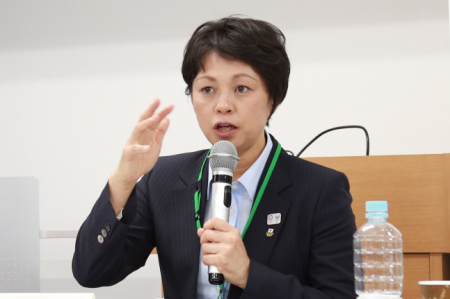
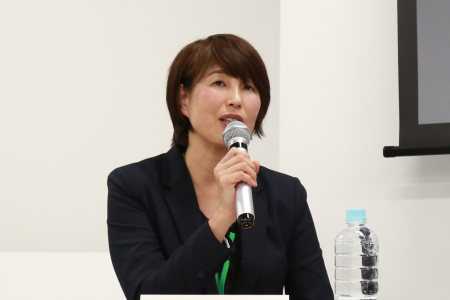
Looking at the answers of tampon users in the survey on sanitary products, it is obvious that most of the problems concerning the “3 major problems of stuffiness, leaking and shifting” can be solved by using tampons. However, its usage rate in Japan is still very low at around 30% even during competitions and games.
Ms. Kayo Kitano, who has experience playing in Europe, said, “The usage was 100% pill and tampon in Denmark. When I was asked, ‘Can you perform as good as us even though you do not use them?’, I felt embarrassed that I did not know about these products and never have used them before, and I was surprised by the fact that in developed countries, players would go this far to pursue better performance to win. I teach Japanese national juniors and at schools. I would like to recommend this fresh approach to encourage the usage of tampon and pills just like how we teach the way of training, taking nutrition, and taking enough rest to win.” Furthermore, as a school nurse, she shared the dilemma that there is a possibility that perceptions and stereotypes in Japan that menstruation = sex might be a factor that is blocking the recommended approach.
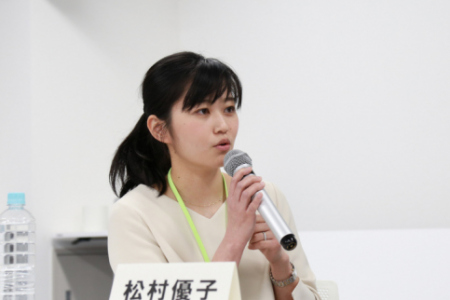
As a physical and physiological issue for female athletes, Deputy Director Ms. Koikawa introduced that 24.8% of all athletes and para-athletes suffer from “bladder leakage (light urinary incontinence)” according to the survey. Half of them answered that they do not take any measures, and it became clear that it is necessary to disseminate and promote a liquid absorption sheet designed specifically for urinary incontinence that uses a different absorbent material from that of sanitary napkins and pantyliners.
Regarding the bladder leakage in athletes, Dr. Matsumura explained, “Since athletes often strain their stomach, their pelvic floor muscles can easily get weak due to the daily pressure. Therefore, when abdominal pressure is applied, intra-abdominal pressure increases which likely causes stress urinary incontinence to occur.” When Ms. Kitano was asked about the necessity of care for athletes who return to her sports after giving childbirth, she answered, “These are issues that we have to face if you are a female. If you experience bladder leakage, you tend to try and save energy and become negative. Pelvic floor muscles are different from those muscles that can be built by daily training, so I want to spread the fact that pelvic floor muscles can be strengthened easily with only a little consciousness.”
Panelists gave many ideas and suggestions such as improving the package appearance for easy to buy, disclosing correct usage and accurate information on the product, and developing new sales routes to sell at sports equipment stores and underwear stores.
Ms. Oki, who has experience teaching at the Japan Institute of KEIRIN, introduced that during the pre-training before admission, she used to suggest students use a tampon and explain the usage of a cream that prevents sore crotch. Since many students have no experience using tampons, students felt much easier after hearing the experiences from her and learning from the lectures given by the manufacturing company of the products.
Also, she shared an episode involving female road racers of the Japan national team. When the road racers visited the United States for a training camp, they were astonished when they witnessed the huge sanitary hygiene department and the fulfillment of sports sanitary goods at the stores, and immediately made a video call to Ms. Oki in Japan.
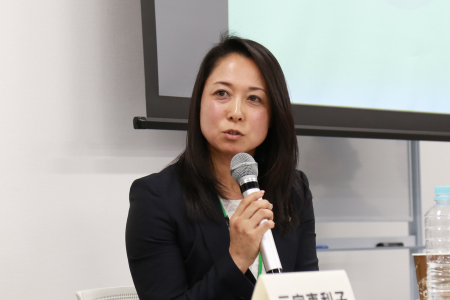
Lastly, Deputy Director Ms. Koikawa, who served as the coordinator, said, ” Japanese Center for Research on Women in Sport will continue to stream various information through the internet, so I would like all of you to catch what you need. I think we must continue to carry out activities so to bring ‘Be Active’ products to everyone and motivate everyone to become more active in sports activities even during menstruation.”
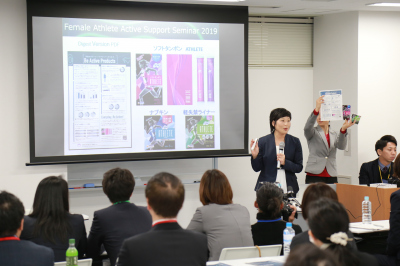
of the results of the survey conducted by the Center
and were encouraged to post it at a place of female athlete’s attention
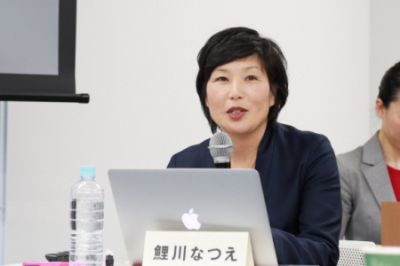
A free sample of soft tampon called “ATHLETE” which was designed for female athletes by the Japanese Center for Research on Women in Sport is available. The package includes a QR code that gives access to athletes’ voices, research data, and tutorial videos to explain how to use them, so it is user-friendly even to beginners.
Closing Address
For the closing address, Executive Director Dr. Etsuko Ogasawara said with her strong passion, “We are conducting seminars and researches on the theme of how to encourage athletes to become more active, but if this does not reach everyone, there is no meaning at all. We truly wish that tampons, napkins, and pantyliners specially designed for athletes will go out on the market soon.”
Many positive comments were heard from the participants, such as “I was glad to hear the true voices of top athletes” and “I want to tell what I learned to the children that I coach”, making the seminar end with great success.
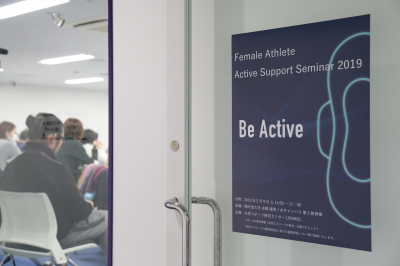
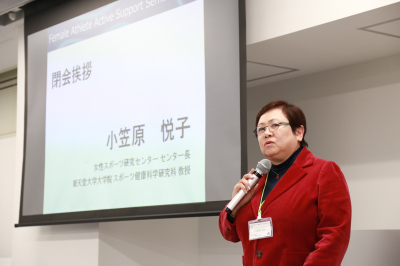
Childcare Room
